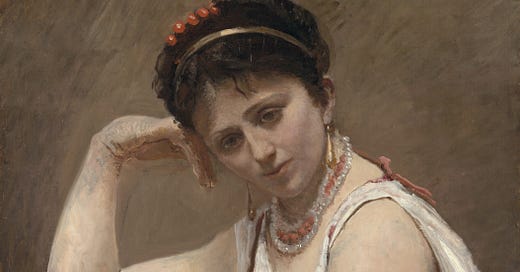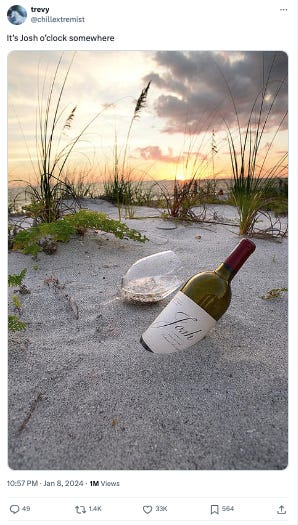Heyyyyyyy. It’s almost Taurus season so let’s celebrate that. In the meantime, I am here to share everything you need to know about what everyone’s saying about Lauren Oyler’s new book, the download on an excellent archeological discovery, a delightful bit of museum hijinks, and more.
Congratulations to Bookforum on what I hope are skyrocketing subscription numbers. Mine just automatically renewed, and thank god. Discussions of the lit mag filled my feed on the site formerly known as Twitter on Tuesday, all because of pan that felt much more like a justified evisceration: Ann Manov absolutely skewers Lauren Oyler’s book of essays, No Judgment, which published on February 27. In the opening of her review, Manov lays out the context that explains why the internet reacted to a harsh literary review with such glee: Oyler herself is known for her exceptionally severe reviews of mass-beloved cultural figures like Jia Tolentino and Sally Rooney. The critic has been critiqued—thoroughly.
It would be easy to read Manov’s review as one that delights in its harshness purely because of its subject—it is, after all, full of devastating blows like, “Oyler clearly wishes to be a person who says brilliant things—the Renata Adler of looking at your phone a lot—but she lacks the curiosity that would permit her to do so.” But as the review progresses, it gets increasingly scientific, like being edited by someone who spent a decade on The New Yorker’s fact-checking team. Most devastating are the instances in which Manov digs into Oyler’s seemingly shallow research: She finds, apparently through her own elementary Google searches, the Wikipedia pages from which Oyler appears to pull her references. And while her review includes no shortage of petty asides, she concludes with her own declaration about the purpose of criticism and essay writing—a purpose she decidedly says that Oyler does not fulfill.
Interestingly enough, the subject of Wikipedia and shallow research comes up in Sheila Heti’s interview with Oyler that ran in The Paris Review online last week. Consider this question and answer:
I simply….would melt into the ground. This makes me feel justified about my feelings of being insufficiently edified and informed to create the work I aspire to create; I haven’t completed the depth of reading I feel I must complete to do so! And I admit that!! (And perhaps use that as an excuse to not produce more work, but I digress.) But of course, as someone who referred to herself (jokingly???) as the “the preeminent, most widely read critic of [her] generation” in at least two recent interviews, Oyler appears to get by with her own approach.
Manov isn’t the only one to take Oyler to task on her latest book (her first book, the novel Fake Accounts, came out in 2021. As a whole, it did not get great reviews). In Becca Rothfield’s Washington Post review, “Lauren Oyler Thinks She’s Better Than You,” she makes the assessment: “All of the fruit that Oyler picks is so low-hanging that she would do better to leave it rotting on the ground.” Oh!
Steven Phillips-Horst’s Interview mag interview with Oyler, which came out the same day as the Manov piece, has a more flattering sense of her work. Interviewer and interviewee laugh together about how Oyler’s put-on sense of pretension in one of her essays is so obviously ironic—maybe readers just aren’t smart enough to get it? Hm. Truth be told, I fear this interviewer suffers from an affliction that has increasingly pervaded our media landscape: A desperate vying for a subject’s approval and validation that fails to hold that subject to thorough questioning and inspection.
Manov’s review points out that Oyler says that she’s read great works of literature, that she has excellent taste and discernment thanks to her Yale education; yet in her conversations with Heti and Phillips-Horst, Oyler seemingly tries to ground herself by pointing out, actually, she is quite young. In her convo with Interview, she recalls her childhood in West Virginia—as she disparages the people from West Virginia who “never vote for better healthcare because they don’t want to admit that the healthcare they have is destroying their lives and terrible”—and claims that she “didn’t read a real book until [she] was 18.” Okay….and that got her into Yale? Alright!
I’ve not read No Judgment, and I don’t have plans to do so, but I simply loved this spate of discourse. I will admit that Oyler’s comments about the thesaurus in her Interview interview have inspired me to order my own physical thesaurus, as I’ve grown deeply unsatisfied with the way Thesaurus.com no longer meets my needs. I do have a copy of Oyler’s novel, which I haven’t read. At the end of the day, I am nosy, and I love a hate read, so I will probably pick it up at some point or another. In the meantime this was fun.
In other literary criticism news: Brandon Taylor’s review of Les Rougon-Macquart, Émile Zola’s cycle of 20 novels is in the London Review of Books. He spent the past two years reading and annotating the books, and in his review he shares his recommendations and refuses to answer the question posited in the article’s title: “Is it even good?” Fair! The piece is worth the read.
How to prevent AI from taking your job: Have good taste. Okay! In a talk at Howard University this week, OpenAI founder Sam Altman said that the best way people can “future-proof” their careers is to have the following skills: critical thinking, creativity, and the ability to figure out what other people want. If everyone had an army of AI tools, he says, the most successful people would be those who can take what the AI presents them and choose the best, more innovative ideas; curation is a skill. You cannot teach taste…even to an LLM.
Altman goes on to say that he’ll always care more about a book or piece of art when he learns about the human behind it—essentially, he doesn’t think that AI is going to replace the whole of human expression. Oh good! So why are a whole bunch of authors suing OpenAI for allegedly misusing their material?
Whatever happened to that band Bastille? Well someone should go wake them up because there is POMPEII NEWS. A bunch of frescoes were just discovered at the archaeological site, dating back to 15BC and AD40-50. They depict Helen of Troy meeting Paris, as well as Apollo trying to seduce the priestess Cassandra.
Gabriel Zuchtriegel, director of the archeological site told The Guardian that the purpose of the frescos was to spark conversation during dinner; both stories capture certain truths about individualism vs. fate. “People would meet to dine after sunset; the flickering light of the lamps had the effect of making the images appear to move, especially after a few glasses of good Campanian wine,” he said. Adding to my Pinterest board for my future home!!!
Free him!!! An employee of the Pinakothek der Moderne in Munich was fired for hanging his own painting in the museum’s modern art collection and banned from visiting the museum in the future. Feels a bit extreme, IMO. We don’t have any details on what the painting looked like or how long it was up. And as the New York Times points out, this kind of hijinks hasn’t always ended badly: The same thing basically happened at an art museum in Bonn, and then the museum ended up sharing the painting on Instagram, helping the artist sell it for about $4k (which he donated to charity). “And I oooop!” commented Museum Ludwig, Cologne’s modern and contemporary art museum, on the IG post.
The most media savvy people you know are getting into the art world. This week, Puck, the media company at “the nexus of power, money, and ego”—which has a deeply impressive roster of journalists—announced that art world columnist Marion Maneker was joining its staff. He’ll write a bi-weekly newsletter called Wall Paper and cease publishing his Substack, Artelligence, which has more than 32,000 subscribers. This is the first time Puck has acquired an existing newsletter, Axios reported. I am already a Puck subscriber (like everyone else, I love Lauren Sherman’s fashion reporting) and I will certainly be following Maneker’s work.
Also in art world news: Yayoi Kusama, who you know for her pumpkins and polka dots, was the top-selling contemporary artist in 2023, according to the Hiscox Artist Top 100. She sold $80.9 million worth of her art at auction—more than $30 million more than David Hockney.
At the dawn of her show at the San Francisco Museum of Modern Art last year, Kusama faced justified criticism for previous racist remarks—specifically, anti-Black comments—in her 2002 autobiography. Journalist Dexter Thomas pointed out that Kusama also made racist comments in even earlier written works. Kusama apologized for the “language” in her book, saying: “My message has always been one of love, hope, compassion, and respect for all people. My lifelong intention has been to lift up humanity through my art. I apologize for the pain I have caused.”
Finally, cable for snobs. The Criterion Channel rolled out Criterion24/7 this week; basically, it’s a constant stream of random movies, perfect for when you don’t know what to watch but you do know that putting on Love Is Blind would propel you into a mental tailspin. Right now I have Wings of Desire (1987) playing in the background. You can see what’s on here. Congrats to all the guys who put “criterion and chill?” in their Hinge profiles.
I just know this will destroy me. Aleksei Navalny wrote a memoir before his death at age 47 in a Russian penal colony in February. It is called Patriot and it will be released in October in the U.S.; he wrote the book entirely himself, but his widow Yulia Navalnaya is working on edits with publisher Knopf. I highly, highly recommend watching the documentary Navalny—it came out in 2022 and won an Oscar in 2023, which Yulia (who lives in exile outside of Russia) accepted. It is a truly incredible work of journalism—the moments they capture on camera are jaw-dropping. It’s also incredibly eerie and emotional to watch. It’s streaming on Max.
Americans love a Cab Sav, according to a recent, admittedly not-very-statistically significant survey by YouGov. I’ll admit I didn’t expect to see that people in the U.S. prefer red wine, considering the popularity of subpar Chadonnays. Perhaps most shocking, though, is that 43% of respondents haven’t ever tried a Malbec. I guess people just love their Josh.
See you in a few days! ▲










